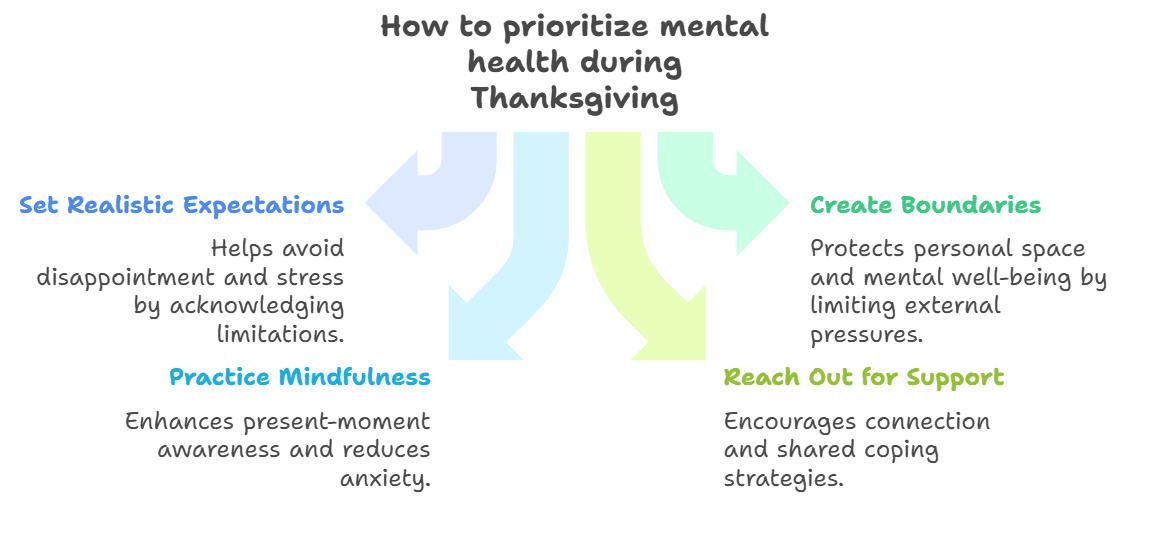
Thanksgiving is a time for gratitude, family, and reflection, can also be a period of heightened stress, loneliness, and emotional strain for many.
For those struggling with mental health challenges, the pressure to be cheerful, navigate family dynamics, or cope with feelings of isolation can feel overwhelming.
This is why it’s crucial to address mental health during Thanksgiving with care and compassion. In this article, we’ll explore how to craft meaningful mental health messages that offer support, encouragement, and practical advice.
You’ll learn how to balance gratitude with empathy, practice self-care, and support loved ones who may be struggling.
By the end, you’ll have the tools to create a thanksgiving that’s not only joyful but also mindful of mental health. Let’s dive in.
Table of Contents
Why Mental Health Matters During Thanksgiving
Thanksgiving is often portrayed as a joyous occasion filled with family gatherings, delicious meals, and heartfelt conversations.
However, for individuals dealing with mental health challenges, the holiday can bring about a mix of emotions.
The pressure to be cheerful, the stress of family dynamics, and the weight of unmet expectations can exacerbate feelings of anxiety, depression, or loneliness.
Table 1: Common Holiday Stressors and Their Impact on Mental Health
| Stressor | Impact on Mental Health | Percentage of People Affected |
| Family Dynamics | Increased anxiety, tension, and emotional exhaustion due to conflicts or unresolved issues. | 40% |
| Grief and Loss | Heightened feelings of sadness, loneliness, and nostalgia for lost loved ones. | 30% |
| Financial Stress | Worry, guilt, and pressure related to holiday expenses or hosting responsibilities. | 20% |
| Social Pressure | Feelings of inadequacy or stress from societal expectations to appear happy and grateful. | 10% |
The Emotional Weight of the Holidays
The holiday season, including Thanksgiving, can be particularly difficult for those who have experienced loss, are dealing with mental health issues, or feel isolated.
The societal expectation to be happy and grateful can create a stark contrast with how someone may actually feel, leading to increased stress and emotional strain.
The Importance of Acknowledging Mental Health
Acknowledging these challenges and offering support is essential. A simple, thoughtful message can make a significant difference in someone’s day, reminding them that they are not alone and that their feelings are valid.
Mental health professionals emphasize the importance of open conversations about mental health, especially during the holidays when emotions run high.
Crafting Mental Health Messages for Thanksgiving
When creating mental health messages for Thanksgiving, it’s important to strike a balance between gratitude and empathy. Here are some key themes and examples to consider:
1. Messages of Gratitude and Support
“This Thanksgiving, I’m grateful for you and your strength. Remember, it’s okay to not be okay, and I’m here for you every step of the way.”
“As we celebrate Thanksgiving, let’s take a moment to appreciate the small victories and the courage it takes to face each day. You are not alone.”
Explanation: These messages combine gratitude with a recognition of the recipient’s struggles.
They emphasize support and understanding, which can be incredibly comforting for someone dealing with mental health challenges.
2. Acknowledging Challenges
“Thanksgiving can be tough, and it’s okay to feel overwhelmed. Take things one step at a time, and know that it’s okay to ask for help.”
“Holidays can bring up a lot of emotions, and that’s completely normal. Let’s focus on self-care and kindness this Thanksgiving.”
Explanation: These messages validate the recipient’s feelings and normalize the experience of struggling during the holidays.
They also encourage self-compassion and seeking help when needed.
3. Encouraging Self-Care
“This Thanksgiving, prioritize your mental health. Whether it’s taking a walk, journaling, or simply resting, remember that self-care is a form of gratitude.”
“Amid the hustle and bustle of the holiday, don’t forget to check in with yourself. Your well-being matters.”
Explanation: These messages highlight the importance of self-care, especially during a busy and potentially stressful time like Thanksgiving.
They remind the recipient that taking care of their mental health is a priority.
4. Promoting Connection
“Thanksgiving is a time to connect with loved ones, but it’s also a time to reach out to those who may be struggling. A simple message can mean the world.”
“Let’s use this Thanksgiving to strengthen our connections and remind each other that we’re in this together.”
Explanation: These messages emphasize the importance of connection and reaching out to others, especially those who may be feeling isolated or alone during the holidays.
The Role of Gratitude in Mental Health
Gratitude is a powerful tool for improving mental health. Research has shown that practicing gratitude can reduce stress, enhance emotional resilience, and foster a sense of well-being.
During Thanksgiving, incorporating gratitude into your mental health messages can have a profound impact.
How to Practice Gratitude:
Keep a Gratitude Journal: Write down three things you’re grateful for each day. This simple practice can shift your focus from what’s lacking to what’s abundant in your life.
Express Gratitude to Others: Take the time to thank the people in your life who have made a difference. A heartfelt message can strengthen relationships and boost mental health.
Reflect on Small Wins: Celebrate the small victories, whether it’s getting out of bed on a tough day or completing a task you’ve been putting off.
Practicing gratitude can help reframe negative thoughts and foster a more positive outlook.
By focusing on what you’re grateful for, you can reduce stress and improve your overall mental well-being.
Supporting Loved Ones with Mental Health Challenges
If you know someone who is struggling with their mental health, Thanksgiving can be an opportunity to offer support. Here are some ways to help:
1. Listen Without Judgment
Sometimes, the best thing you can do is listen. Let your loved one know that you’re there for them and that their feelings are valid.
Listening without judgment creates a safe space for your loved one to express their feelings. It shows that you care and are willing to support them without trying to “fix” their problems.
2. Offer Practical Help
Offer to help with holiday preparations or simply spend time together. Small gestures can make a big difference.
Practical help can alleviate some of the stress and pressure your loved one may be feeling. It also shows that you’re willing to take action to support them.
3. Encourage Professional Support
If your loved one is struggling, gently encourage them to seek professional help. Remind them that it’s okay to ask for support.
Encouraging professional support can be a crucial step in helping your loved one manage their mental health. It’s important to approach this suggestion with sensitivity and care.
Thanksgiving Mental Health Tips
To make the most of Thanksgiving while prioritizing mental health, consider these tips:

1. Set Realistic Expectations
It’s easy to get caught up in the idea of a “perfect” holiday. Remember that it’s okay if things don’t go as planned.
Setting realistic expectations can help reduce stress and disappointment. Focus on what’s most important, such as spending time with loved ones, rather than striving for perfection.
2. Create Boundaries
If certain family dynamics or situations are stressful, set boundaries to protect your mental health.
Boundaries are essential for maintaining your mental well-being. It’s okay to say no to certain activities or conversations that may be triggering or stressful.
3. Practice Mindfulness
Take a few moments each day to practice mindfulness or meditation. This can help you stay grounded and present.
Mindfulness practices can help you stay centered and reduce anxiety. Even a few minutes of deep breathing or meditation can make a difference.
4. Reach Out for Support
If you’re feeling overwhelmed, don’t hesitate to reach out to a friend, family member, or mental health professional.
Seeking support is a sign of strength, not weakness. Don’t be afraid to ask for help if you’re struggling.
Understanding Emotional Triggers
Several factors can contribute to mental health challenges during Thanksgiving:
Family Dynamics: Family gatherings can reopen old wounds, resurrect past conflicts, or create tension around complex relationships.
Grief and Loss: Holidays often amplify feelings of loss, especially for those who have experienced the death of a loved one or significant life changes.
Social Pressure: The expectation of appearing happy and grateful can feel overwhelming for individuals struggling with depression or anxiety.
Financial Stress: The financial burden of hosting or traveling during the holidays can create additional mental strain.
Creating a Personal Thanksgiving Wellness Plan (Self-Care Checklist)
1- Emotional Preparation
- Identify potential triggers
- Develop coping mechanisms
- Plan self-soothing activities
2- Boundary Setting
- Communicate limits clearly
- Prepare gentle but firm responses
- Have a support system on standby
3- Post-Gathering Recovery
- Schedule downtime
- Engage in restorative activities
- Practice self-compassion
Thanksgiving is a time to reflect on gratitude, but it’s also an opportunity to extend kindness and support to those who may be struggling with mental health challenges.0
Throughout this article, we’ve explored how to craft thoughtful mental health messages, the importance of practicing gratitude, and practical tips for supporting loved ones and prioritizing self-care during the holiday season.
By acknowledging the emotional weight of the holidays and offering empathy, we can create a more inclusive and supportive environment for everyone.
Mental health is just as important as physical health, and small actions—like sending a heartfelt message or simply listening—can make a big difference. This Thanksgiving, let’s commit to spreading messages of hope, gratitude, and understanding.
Final Thoughts
As we gather around the table this Thanksgiving, let’s not forget the importance of mental health. Whether you’re crafting a message for a loved one or taking steps to care for your own well-being, every effort counts.

